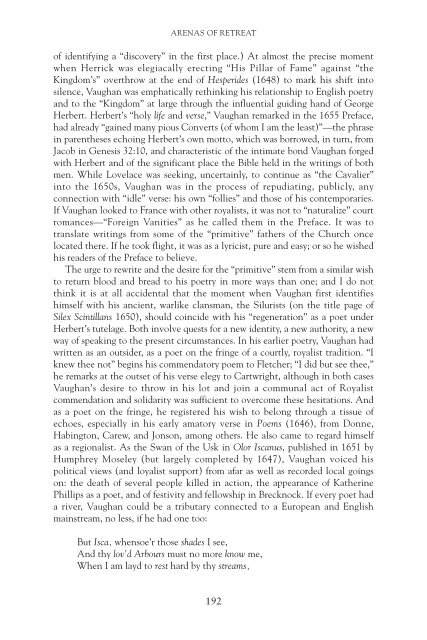ENG LYRIC POETRY.pdf - STIBA Malang
ENG LYRIC POETRY.pdf - STIBA Malang
ENG LYRIC POETRY.pdf - STIBA Malang
Create successful ePaper yourself
Turn your PDF publications into a flip-book with our unique Google optimized e-Paper software.
ARENAS OF RETREAT<br />
of identifying a “discovery” in the first place.) At almost the precise moment<br />
when Herrick was elegiacally erecting “His Pillar of Fame” against “the<br />
Kingdom’s” overthrow at the end of Hesperides (1648) to mark his shift into<br />
silence, Vaughan was emphatically rethinking his relationship to English poetry<br />
and to the “Kingdom” at large through the influential guiding hand of George<br />
Herbert. Herbert’s “holy life and verse,” Vaughan remarked in the 1655 Preface,<br />
had already “gained many pious Converts (of whom I am the least)”—the phrase<br />
in parentheses echoing Herbert’s own motto, which was borrowed, in turn, from<br />
Jacob in Genesis 32:10, and characteristic of the intimate bond Vaughan forged<br />
with Herbert and of the significant place the Bible held in the writings of both<br />
men. While Lovelace was seeking, uncertainly, to continue as “the Cavalier”<br />
into the 1650s, Vaughan was in the process of repudiating, publicly, any<br />
connection with “idle” verse: his own “follies” and those of his contemporaries.<br />
If Vaughan looked to France with other royalists, it was not to “naturalize” court<br />
romances—“Foreign Vanities” as he called them in the Preface. It was to<br />
translate writings from some of the “primitive” fathers of the Church once<br />
located there. If he took flight, it was as a lyricist, pure and easy; or so he wished<br />
his readers of the Preface to believe.<br />
The urge to rewrite and the desire for the “primitive” stem from a similar wish<br />
to return blood and bread to his poetry in more ways than one; and I do not<br />
think it is at all accidental that the moment when Vaughan first identifies<br />
himself with his ancient, warlike clansman, the Silurists (on the title page of<br />
Silex Scintillans 1650), should coincide with his “regeneration” as a poet under<br />
Herbert’s tutelage. Both involve quests for a new identity, a new authority, a new<br />
way of speaking to the present circumstances. In his earlier poetry, Vaughan had<br />
written as an outsider, as a poet on the fringe of a courtly, royalist tradition. “I<br />
knew thee not” begins his commendatory poem to Fletcher; “I did but see thee,”<br />
he remarks at the outset of his verse elegy to Cartwright, although in both cases<br />
Vaughan’s desire to throw in his lot and join a communal act of Royalist<br />
commendation and solidarity was sufficient to overcome these hesitations. And<br />
as a poet on the fringe, he registered his wish to belong through a tissue of<br />
echoes, especially in his early amatory verse in Poems (1646), from Donne,<br />
Habington, Carew, and Jonson, among others. He also came to regard himself<br />
as a regionalist. As the Swan of the Usk in Olor Iscanus, published in 1651 by<br />
Humphrey Moseley (but largely completed by 1647), Vaughan voiced his<br />
political views (and loyalist support) from afar as well as recorded local goings<br />
on: the death of several people killed in action, the appearance of Katherine<br />
Phillips as a poet, and of festivity and fellowship in Brecknock. If every poet had<br />
a river, Vaughan could be a tributary connected to a European and English<br />
mainstream, no less, if he had one too:<br />
But Isca, whensoe’r those shades I see,<br />
And thy lov’d Arbours must no more know me,<br />
When I am layd to rest hard by thy streams,<br />
192










